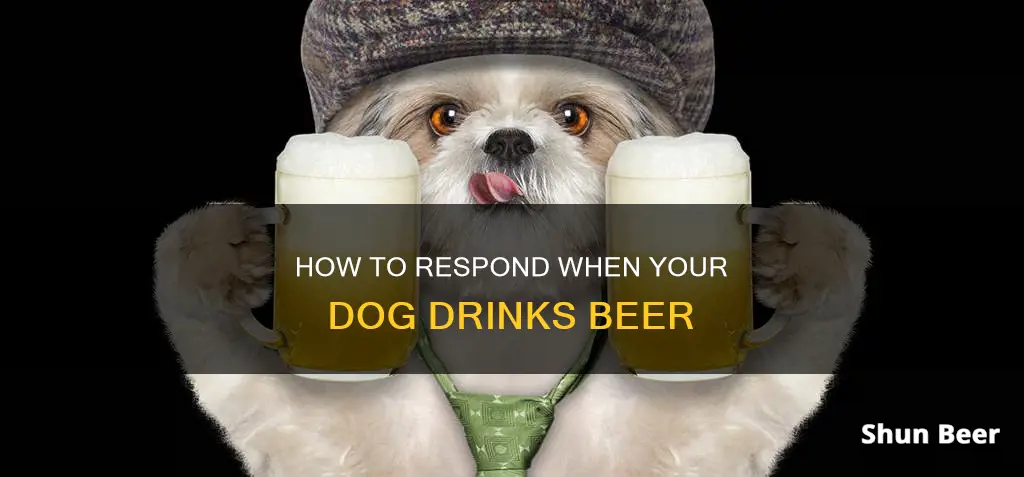
Dogs should never drink beer, but accidents can happen. If your dog consumes beer, it's important to act quickly as it can be toxic to dogs and cause alcohol poisoning. The amount of alcohol and the size of your dog will determine how fast they get alcohol poisoning. Even a small amount of beer can be dangerous, and you should contact your vet, an emergency clinic, or a pet poison helpline for advice.
| Characteristics | Values |
|---|---|
| What to do if your dog drinks beer | Call your vet or the pet poison helpline and tell them how much your dog weighs, what kind of alcoholic drink they consumed, and how much they drank. |
| Signs of alcohol poisoning in dogs | Vomiting, disorientation, lack of coordination, tremors, seizures, lethargy, decreased breathing rate, low body temperature, low blood sugar, and hypotension |
| How to prevent your dog from drinking beer | Put your dog in another room or in their crate, keep your beer or alcohol stored away from your dog, do not leave alcoholic drinks unattended, put your beer in a glass with a lid, and pay attention to your dog when you have guests over |
What You'll Learn

Call your vet or an emergency clinic
If your dog has consumed beer, it is important to remain calm and take immediate action. Calling your vet or an emergency clinic is a crucial step in ensuring your dog receives the necessary care. Here are some detailed instructions and considerations to keep in mind when calling for veterinary assistance:
Provide Essential Information
When you call the vet or emergency clinic, be prepared to provide detailed information about the situation. Let them know the amount of beer your dog consumed, its weight, and any noticeable symptoms. This information will help the veterinarian determine the severity of the situation and provide appropriate advice.
Describe Symptoms and Severity
Inform the vet about any symptoms your dog is exhibiting, such as vomiting, lethargy, disorientation, lack of coordination, or difficulty breathing. These symptoms could indicate alcohol poisoning, and the vet will need this information to assess the urgency of the case.
Inquire About Inducing Vomiting
In some cases, inducing vomiting at home may be recommended to remove the alcohol from your dog's system. However, this should only be done under the guidance of a veterinarian. Ask the vet if inducing vomiting is appropriate and follow their instructions carefully.
Seek Immediate Veterinary Care
If your dog is displaying severe symptoms, such as seizures, tremors, or difficulty standing, do not hesitate to take them to the emergency vet immediately. Alcohol poisoning can be life-threatening, and timely veterinary intervention is crucial for your dog's health and well-being.
Inquire About Alternative Options
If you are unable to reach a veterinarian or emergency clinic, inquire about alternative options. Some pet insurance providers offer 24/7 online vet chat services, which can provide you with valuable advice and guidance until you can physically bring your dog to a veterinary facility.
Remember, the health and safety of your dog are paramount. Do not hesitate to seek veterinary assistance if you suspect your dog has consumed beer or is displaying any concerning symptoms. The faster you act, the better the chances of a positive outcome for your furry friend.
Mixing Robitussin and Beer: Is it Safe?
You may want to see also

Provide your vet with your dog's weight and details of the beer
If your dog has drunk beer, it's important to act quickly. Beer is toxic to dogs, and even a small amount can be dangerous. The first thing you should do is call your vet or the pet poison helpline. If you have pet insurance, you may be able to access an online vet chat.
Based on the information you provide, the vet will be able to advise on the best course of action. They may tell you to monitor your dog or, in more severe cases, bring them to an emergency vet. Follow their instructions.
Your vet may recommend inducing vomiting to clear the toxin from your dog's stomach or putting them on intravenous fluids to replenish them. Intubation may also be necessary, depending on your dog's symptoms.
Beer and the DASH Diet: What You Need to Know
You may want to see also

Look out for symptoms of alcohol poisoning
If your dog has drunk beer, it's important to look out for symptoms of alcohol poisoning. Even a small amount of alcohol can be toxic to dogs, and they can develop alcohol poisoning very quickly.
Signs of alcohol poisoning in dogs include:
- Vomiting or retching
- Diarrhea
- Disorientation and lack of coordination, such as staggering or a loss of coordination, which can range from being wobbly to being unable to walk
- Tremors and seizures
- Depression or lethargy
- Difficulty breathing or a decreased respiratory rate
- Low blood sugar (hypoglycemia)
- Low blood pressure (hypotension)
- Low body temperature (hypothermia)
- Muscle weakness or collapse
If your dog is showing any of these symptoms, contact your vet or an emergency clinic immediately. Do not try to treat alcohol poisoning at home. The vet may induce vomiting to help remove the alcohol from your dog's digestive system or put them on intravenous fluids to replenish them. Intubation may also be necessary, depending on your dog's symptoms.
Beer and Colonoscopy: What's the Safe Timeline?
You may want to see also

Induce vomiting if instructed to do so by a vet
If your dog has consumed beer, it is important to contact your vet, an emergency clinic, or a pet poison helpline. They will be able to advise you on the best course of action, which may include bringing your dog in for an emergency visit.
In some cases, your vet may instruct you to induce vomiting to help remove the alcohol from your dog's digestive system. This is only recommended if advised by a vet and if the consumption happened less than 15 minutes ago. If it has been longer, vets will determine if the amount ingested is toxic and choose supportive care.
If your dog is staggering or disoriented, take them to the emergency vet immediately. Do not try to treat alcohol poisoning at home unless instructed to do so by a veterinarian.
- Put your dog in another room or in their crate when you are consuming alcohol.
- Store your alcohol carefully, out of your dog's reach.
- Do not leave alcoholic drinks unattended.
- Use a glass with a lid to prevent your dog from accessing your drink.
- Pay close attention to your dog when you have guests over, and consider putting them in another room to keep them away from alcoholic beverages.
Beer and Sore Throats: A Risky Relief?
You may want to see also

Provide your dog with dog-safe drinks instead
It is important to keep your dog away from alcoholic drinks, as even a small amount can be toxic. Beer, wine, and other alcohols are strictly off the menu for dogs and can cause an upset stomach, seizures, and difficulty breathing. Even a few licks of beer can be enough to make a small dog appear drunk.
If you want to include your dog in the festivities, there are plenty of dog-safe drinks you can give them instead. These include:
- Dog beers—these are non-alcoholic and usually made with water and bone broth, but they can also contain vegetables, fruits, and glucosamine.
- Chicken broth.
- Plain water—the universal source of hydration for dogs and their owners.
If you want to give your dog a special drink, make sure it's one that's safe for them.
Valerian Tea and Beer: A Safe Mix?
You may want to see also
Frequently asked questions
If your dog drinks beer, you should call your vet or the pet poison helpline immediately. Tell the vet how much your dog weighs, what kind of beer they drank, and how much they consumed.
Signs of alcohol poisoning in dogs include vomiting, disorientation, lack of coordination, tremors, seizures, lethargy, decreased respiratory rate, low blood sugar, low blood pressure, and low body temperature.
The published oral lethal dose in dogs is 5.5 to 7.9 g/kg of 100% ethanol. However, the severity of your dog's reaction to alcohol may vary depending on their size and how much they drank.
To prevent your dog from drinking beer, keep bottles and cans on a high shelf, place open glasses with alcohol away from edges, and never leave your drink unattended. If you're hosting a party, you may want to keep your dog in a separate room.
Yes, some breweries make a special "dog beer" that is alcohol-free and made with water, bone broth, fruits, and vegetables.







